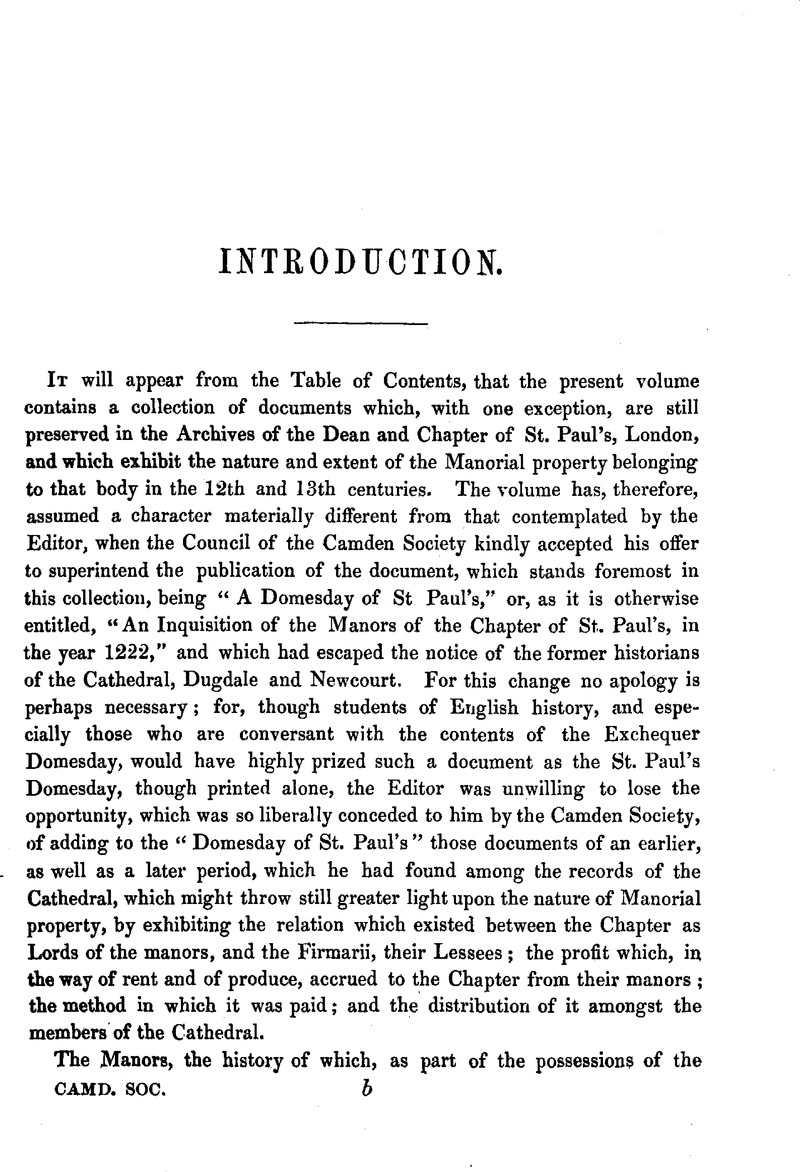No CrossRef data available.
Article contents
Introduction
Published online by Cambridge University Press: 23 February 2010
Abstract

- Type
- Introduction
- Information
- Camden Old Series , Volume 69: The Domesday of St. Paul's of the Year M.CC.XXII.; or, Registrum de Visitatione Maneriorum per Robertum Decanum, and other original documents relating to the manors and churches belonging to the Dean and Chapter of St, Paul's, London in the twelfth and thirteenth centuries. , March 1858 , pp. i - lxi
- Copyright
- Copyright © Royal Historical Society 1858
References
page iii note a Domesday, Essex, p. 13.
page iii note b Domesday, Herts, p. 136
page iii note c Domesday, Essex, p. 13.
page iv note a Domesday, Middx. pp. 127 b, 128 a.
page iv note b Domesday, Bedfordshire, p. 211.
page vi note a “Ut facilius veritas erueretur, pro maneriorum capacitate, pro numero colonorum, modo plures, modo pauciores, eligendos decrevimus artatos præstita jusjurandi religione, quod ad interrogate nee verum supprimerent, nee asserereat falsum scienter.”—p. 112.
page xx note * Much labour has been employed to estimate the sums in this column; but some allowance must be made for errors unavoidable in such a task.
page xxiv note * By G. Poulett Scrope, Esq. 1852. See pages 217, 222.
page xxx note * Vol. I. p. 431.
page xxxii note * See Gentleman's Magazine, April, 1852, p. 369.
page xxxiii note * Statutes of the Realm, vol. I. p. 242.
page xxxiv note * Statutes of the Realm, vol. I. pp. 11, 24, 197.
page xxxiv note † In a book of St. Paul's, marked D, no longer extant, but of which a table of contents is given in Dean Lyseux's Catalogue, A.D. 1447, there was this entry :—"Item de officio et exhibitione Communis Servientis, et quod ipse debet exercere jurisdictionem temporalem Decani et Capituli."
page xxxviii note * A firma might be rendered either in produce or money, as was the case in the manor of Belchamp (see p. 129), and hence the word firma acquired a secondary sense, and in process of time an estate “farmed” meant only an estate “rented.” (See Spelman, in voce Firma.)
page xxxix note * The manor of Navestock is so divided in the Exchequer Domesday. In the reign of Henry I. the division bad ceased. See the Inquisition of Nastock, p. 144.
page xlvi note * In the small sums still paid to the Cathedrals by the Incumbents of Parochial Churches, under the denomination of Pensions, we have traces of ownership exercised by the Lords of Manors over the spiritual revenues of the parish.
page xlvii note * The meaning of the words dizena, and denus denarius, is doubtful.
page lvi note * A payment in lieu of watercarriage.
page lviii note * The desire, however, on the part of the tenants to prove themselves in Ancient demesne was of much earlier date than 1377. The Rotuli Hundredorum of 7 Ed. I. give testimony of unfounded assertions on the part of the Villani of manors, that they held in Ancient demesne. See Vol. II. pp. 843, 844.
page lviii note † It appears also that the tenant in Ancient demesne was exempted from the necessity of taking upon him knighthood for lands so held, for we read in the Statute for respiting Knighthood, “None by reason of any land that he holdeth in manors which now are Ancient demesne of the Crown, as Sokemen, and which lands must also give talliage when the King's demesnes are tallied, shall be distrained to take upon him the order of a Knight.” Statutes of the Realm, vol. i. p. 229.




